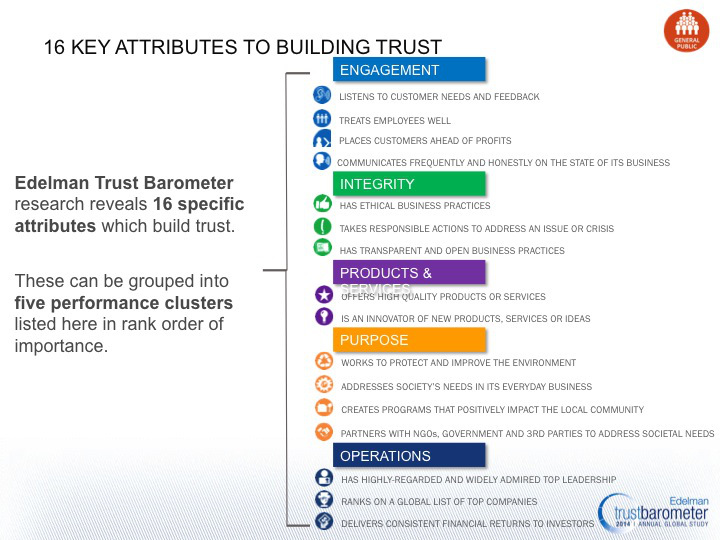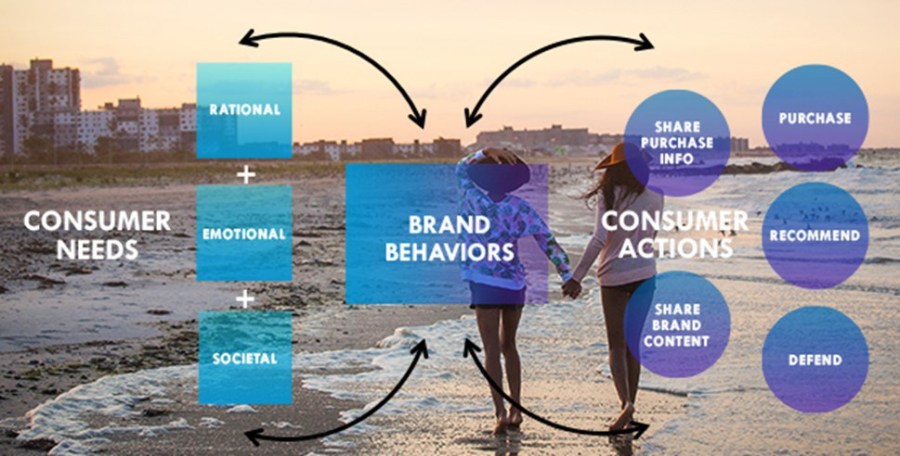Edelman’s Managing Director of Corporate and Public Affairs, Ron Guirguis, recently joined PR Newswire’s SVP of Marketing, Ken Wincko, for an executive roundtable where they discussed the behaviors that companies must exhibit to build trust and create an army of stakeholder evangelists. We are recapping their conversation in a two-part series; today’s post will address Edelman’s research and key takeaways for brands and institutions. Next Tuesday, Ken Wincko will discuss what he thinks these insights mean for businesses at a macro level, and marketing and communications professionals at a micro level.
Trust between brands and their stakeholders has always been a priority for forward thinking companies—but it has never been more of a priority than it is today, now that both parties can connect with each other in a meaningful way via the internet. Though consumers will show no remorse when it comes to holding companies responsible for unethical or distasteful behavior, they will also proudly advocate and defend the brands that are doing their jobs well. For the past fourteen years, the Edelman Trust Barometer has benchmarked consumer confidence in businesses, media and the government through an annual, global survey of more than 30,000. Respondents are asked to rank brands on how much they trust each institution to do what is right. Recently, Edelman launched an additional brandshare™ survey that seeks to understand the evolving relationship between buyers and brands.
Examining the natural intersection of both studies reveals an important opportunity for businesses to build trust by improving engagement and integrity. But what is trust? Wincko defines trust by the equation “Trust = Reliability + Delight/Self-Interest” as a reminder of the principle’s core components, which are strongly aligned to the findings of the 2014 Edelman Trust Barometer.
Key attributes for building trust
“People don’t just buy products anymore, they buy the companies that make products, the values they represent and what they stand for,” says Guirguis.
Guirguis points out that this shift holds businesses more accountable for their actions because “If you’re not doing these things, you can’t PR spin your way out.”
Insights from the Edelman Trust Barometer show that people believe the role of business leaders lays in making ethical decisions and telling the truth, while the role of government is to protect consumers from irresponsible business. The research also revealed 16 key attributes to building trust, which Edelman has further refined into five categories, listed in order of importance:
Overall, consumers, employees and shareholders increasingly expect the entities they invest in and engage in business with to embody the same qualities they value in their peers.
Brands and social purpose
A brand’s social purpose has risen as an area of importance to consumers. According to the study, 84% of respondents believed that “business can pursue its self-interest while doing good work for society.” However there is a balance that needs to be achieved; if executed poorly, corporate giving can be perceived as a deceitful ploy to distract the public from unethical business practices.
Guirguis explains this potential disconnect as, “The idea that how you spend your money as a barometer of trust is gone, it’s about how you make your money.”
During the roundtable, Wincko raised the question of how businesses can genuinely participate in charitable giving while driving a commercial return on investment.
“It’s not a bad thing for your charity work to serve a commercial purpose, it’s a bad thing if it’s not consistent with who you are,” asserts Guirguis. “How your company interacts with society and improves society should be relevant to what you are doing.”
Guirguis adds that an enterprise’s social purpose can be defined by answering these three questions:
- What do you stand for as a company and do you behave in a manner consistent with those values?
- What is it about what we make that will get people to spend their money with us?
- Why should society allow us to operate in their market?
Wincko cites one of his favorite examples of an effort that successfully demonstrated the company’s social purpose, Proctor & Gamble’s Always ‘Like a Girl’ campaign. The campaign sought to evolve the phrase of doing something “like a girl” from an insult into words of empowerment. Wincko explains why this campaign became a viral hit:
“The reason the Always campaign worked is because they essentially took an under-discussed issue which represented a larger societal problem. They created a campaign that was both altruistic in nature but also authentic to their brand identity. Content marketers can learn a lesson here – it’s not about being commercial or sales-y. Credibility is dependent on serving as an expert and an educator for issues that your target audience is educated in. “
Turning trust into brand advocacy
The key attributes of building trust as determined by the Edelman Trust Barometer mirror the qualities of a brand that nurtures its customers into becoming brand advocates as evidenced in Edelman’s brandshare™ study. The latter study revealed three consumer needs that must be met in order to gain loyalty:
- Rational Needs – addressed in the form of responding quickly to concerns and complaints
- Emotional Needs – fulfilled through transparency about the brand and product development process
- Societal Needs – satisfied by confidence that a brand cares about things other than itself, is committed to its community, and belief in a brands core purpose and mission.
If businesses subordinate their own needs in order to meet the rational, emotional and societal needs of their consumers, the consumer is more likely to voluntarily make product recommendations, share branded content, share their personal information, purchase loyally and even defend the brand – which Guirguis believes is the most powerful indicator of a brand advocate.
“There is an opportunity to move from a transaction based value equation to one that is dynamic and multi-dimensional,” concludes Guirguis.
Bottom line? The actions that a company takes across the board must live up to what is being communicated. By communicating frequently and honestly with stakeholders through compelling storytelling and content, brands can form mutually beneficial relationships with consumers that will result in their trust, loyalty, and advocacy.


